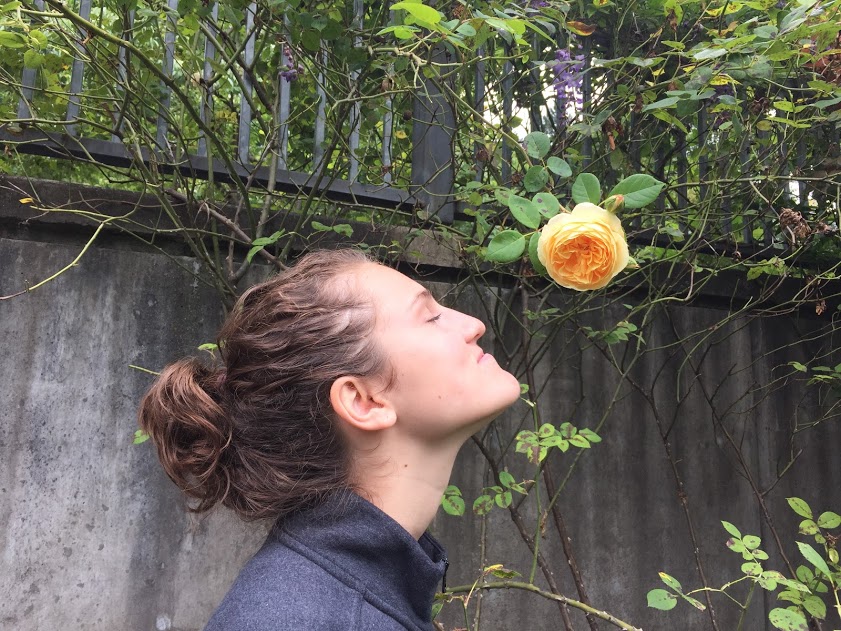I’m gonna say it: I’ve been crabby lately. Snippy, snappy, irritated and crabby.
I’m not sure why—maybe it’s the startup of the early mornings that I’m not quite used to, maybe it’s the cooling weather (not a fan), maybe it’s a midlife crisis (still not a fan.) Maybe it’s the dog. The dog is a pain.
But whatever it is, I need to knock it off. There’s a slight chance it’s getting on some people’s nerves around here.
I’ve always thought of myself as a nice person, but now I’m not so sure. Lately I feel like I “play” nice more than I am nice. I’m non-confrontational, no doubt. I’m a born diplomat and generally passive, so I’ve long avoided the pitfalls of girl drama and I still do, except in one place—which is, unfortunately, my own head. Lots of girl drama there—plenty of pettiness and resentment, irrationality and hypersensitivity—and because it’s in my own head, I don’t have anyone to hash it out with. Except for you. (Thank you for joining me inside my own head.)
Such crabby spells are, obviously, a normal part of life. But acknowledging that doesn’t make them go away, and I want mine to go away. I don’t like being crabby because:
a) it puts a gruesome burden on those around me, and
b) it puts a gruesome burden on me. (And it’s all about me.) So,
c) everybody loses.
I don’t want my children to remember that Mom Always Yelled. But even more, I don’t want to always yell. Especially as we round this last year of all of our children living together at home. (Maybe that’s what I’m crabbiest about of all.)
So it’s established: crabbiness stinks. But how to undo it?
I don’t think there’s a tidy solution; I think life takes its toll and sometimes spills over. But I did hear something yesterday that struck a nerve (and not a frazzled one! Yay.)
A radio host was stressing the benefit that quiet time—alone and with our own thoughts—has on our relationships with others. I found this interesting. I’ve long heard of quiet time as an antidote to stress and means to self-awareness, but never as a means to relationship repair.
Turns out (according to this guy) that when we can sit quietly and be alone with our own thoughts–legitimate thoughts, not scanning our phone or napping or huffing on the treadmill, but actually, silently, thinking–we will improve our relationships with others.
Why?
Because if we can listen to our own thoughts, we can listen to others’ thoughts. If we respect our own thought process, we’ll respect others’ too. When we listen to our own self, we begin liking our own self, and then…wait for it…we begin to like others.

Rachael at the Japanese Gardens, a good place to be quiet.
And here’s the crazy kicker: that productive, healing quiet time can (should?) occur in moments of reverence. As in, sitting quietly in church, hands folded and head down, pondering The Big Questions and The Big People. That act—that specific use of time—will actually improve how you relate to those around you. (I’m thinking the word clarity fits in here somewhere.) Whatever your religious beliefs, drawing nearer to them only does you good.
So it turns out that being quiet isn’t as much about awareness of oneself as it is about awareness of others. I like that.
When we discipline ourselves to stop talking and think, we can discipline ourselves to stop talking and listen. How often do we listen—really listen—to what someone else is saying? Probably about as often as we really listen to ourselves; to our reflective thoughts, our exploratory thoughts, even (forgive the expression) our deep thoughts. We have ’em. Do we respect them? Until we do, we’ll have a hard time respecting others’. (As human beings, we’re kinda jealous that way.).
So the solution to my crabbiness will not be sleep, exercise or therapy, though I could certainly use all three. Rather, I am resolved to plop an intentional dollop of Quiet into my day. Just a little, every day.
Maybe I’ll think about all the things I’m happy about. Or maybe I’ll think about all the things I’m mad about. Either way, what I’ll really try to do is listen. To my thoughts, to myself. So that next time, I can listen to you.